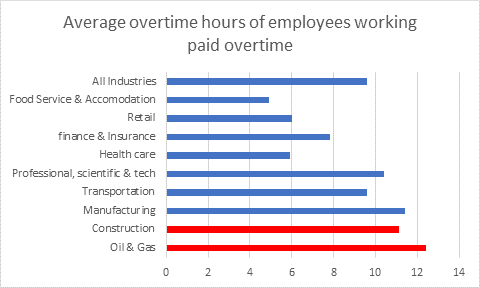Over one quarter of workers in the construction and oil and gas sector, would lose hundreds of dollars in wages each week
Edmonton– Changes to overtime rules proposed by the UCP would have a substantial impact on many Alberta workers. By allowing employers to pay banked hours out at regular pay instead of time-and-a-half, workers will see their premium for working extra hours essentially eliminated.
“Overtime premiums are designed to compensate workers for extra time away from their families and their lives. They’re also designed to encourage employers to hire more people when they have more work to be done, instead of working existing employees to death,” says Alberta Federation of Labour president Gil McGowan.
“The NDP brought Alberta in line with all other provinces by guaranteeing that all banked overtime would be calculated on a time-and-a-half basis instead of a straight-time basis, whether it was taken as cash or time off. Jason Kenney wants to revoke that guarantee and give employers the ability to go to straight time for overtime. This is a big blow for the thousands and thousands of Albertans who work overtime each week.”
Albertans work some of the longest hours in Canada, and accumulate the most overtime hours. Across all industries the weekly average overtime hours of employees working paid overtime is 9.6 hours, in oil & gas the average is 12.4 hours, and in construction the average is 11.1 hours. Albertans work these long overtime hours on the understanding that they will be paid fairly for those extra hours spent away from their families.
17.8% of Albertan workers work overtime every week, that’s 407, 068 workers across the province. 27.4% of oil & gas workers work overtime every week, or 38,442 workers. For an oil & gas worker making the industry average wage, being paid for overtime hours at straight pay will cost them $264 each week or 6 hours if they take the overtime in the form of time off at straight time. 23.4% of construction workers, or 56,394 work overtime every week. For a construction worker making the industry average wage, being paid for overtime hours at straight pay will cost them $251.45 each week or 6.5 hours if they take the time in lieu.
If someone was working 50 hours per week under a banked overtime agreement, they would be losing 3 hours of time off in lieu per week if the banked rate changed back (6 hours overtime *1.5= 9; *1=6). That’s 156 hours over the course of a work year (3*2 weeks*26 pay periods in a year) or 19.5 days off a year if their work day is 8 hours. If employers were not required to pay those hours at 1.5x per hour worked after the bank period expired and the person made $15 dollars per hour that’s $2,340.00 per year lost wages for someone making minimum wage and hoping to use overtime to increase their wages.
“The change proposed by the UCP would make Alberta an outlier among Canadian provinces and it would provide a big financial incentive for employers to use banked overtime to deal with overtime rather than paying it out,” said McGowan, “Employers that don’t currently have a banked overtime policy will almost certainly introduce them in order to avoid paying time-and-a-half”.

Source: StatsCan Table 14-10-0075-01
-30-
MEDIA CONTACT:
Ramona Franson, Communications Director, Alberta Federation of Labour at 780.483.3021 or via e-mail rfranson@afl.org